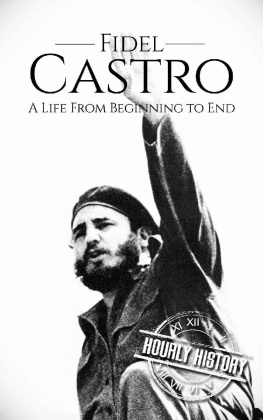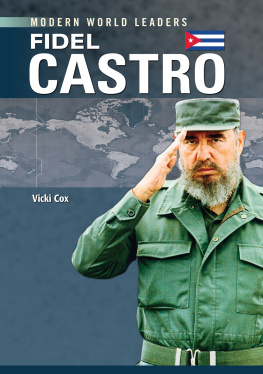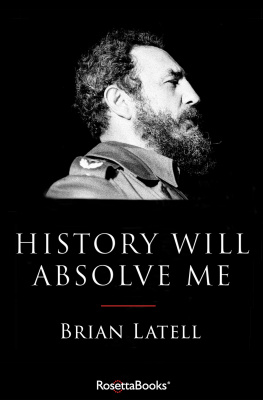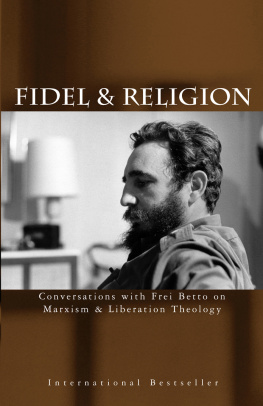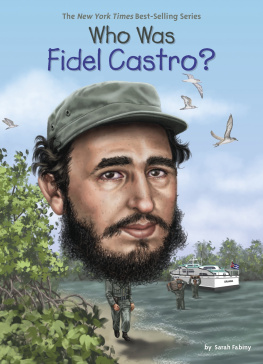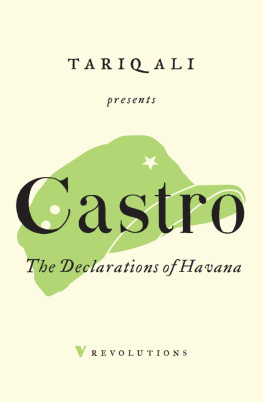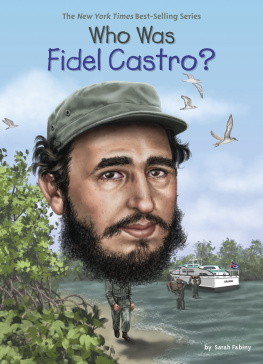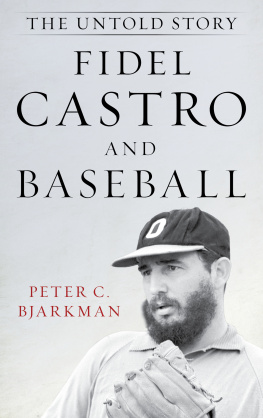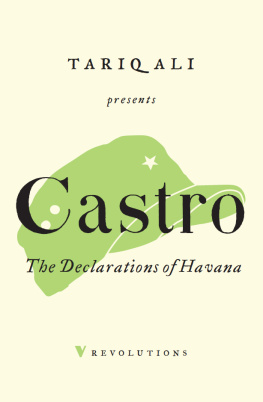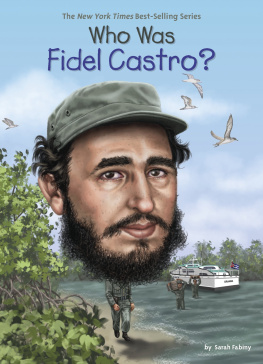che
A MEMOIR BY FIDEL CASTRO
che
A MEMOIR BY FIDEL CASTRO
EDITED BY DAVID DEUTSCHMANN

| Ocean Press
www.oceanbooks.com.au |
Cover design by ::maybe
www.maybe.com.au
Copyright 2006 Fidel Castro
Copyright 2006 Ocean Press
All rights reserved. No part of this publication may be reproduced, stored in a retrieval system or transmitted in any form or by any means, electronic, mechanical, photocopying, recording or otherwise, without the prior permission of the publisher.
ISBN 978-1-921700-83-5
Library of Congress Catalog Card No: 2005938896
PUBLISHED BY OCEAN PRESS
E-mail:

| www.oceanbooks.com.au
|
CONTENTS
On Ches Absence
October 3, 1965 |
Confirmation of Ches Death in Bolivia
October 15, 1967 |
Memorial for Che Guevara
October 18, 1967 |
A Necessary Introduction
1968 |
On the Publication of Ches Bolivian Diary
July 4, 1968 |
Reflections on Che
Chile 1971 |
I Still Dream of Che
1987 |
20th Anniversary of Ches Death
October 8, 1987 |
Interview with Toms Borge
1992 |
On the Return of Ches Remains to Cuba
October 17, 1997 |
An extraordinary personality
Argentina 2003 |
One of Time magazines icons of the century, Ernesto Guevara de la Serna was born in Rosario, Argentina, on June 14, 1928. He made several trips around Latin America during and immediately after his studies at medical school in Buenos Aires, including his 1952 journey with Alberto Granado, on the unreliable Norton motorbike described in his travel journal The Motorcycle Diaries.
He was already becoming involved in political activity and living in Guatemala when, in 1954, the elected government of Jacobo rbenz was overthrown in a CIA-organized military operation. Ernesto escaped to Mexico, profoundly radicalized.
Following up on a contact made in Guatemala, Guevara sought out the group of exiled Cuban revolutionaries in Mexico City. In July 1955, he met Fidel Castro and immediately enlisted in the guerrilla expedition to overthrow Cuban dictator Fulgencio Batista. The Cubans nicknamed him Che, a popular form of address in Argentina.
On November 25, 1956, Che Guevara set sail for Cuba aboard the yacht Granma as the doctor to the guerrilla group that began the revolutionary armed struggle in Cubas Sierra Maestra mountains. Within several months, he was named by Fidel Castro has the first Rebel Army commander, though he continued ministering medically to wounded guerrilla fighters and captured soldiers from Batistas army.
In September 1958, Che Guevara played a decisive role in the military defeat of Batista after he and Camilo Cienfuegos led separate guerrilla columns westward from the Sierra Maestra (later described in his book Reminiscences of the Cuban Revolutionary War).
After Batista fled on January 1, 1959, Che Guevara became a key leader of the new revolutionary government, first as head of the Department of Industry of the National Institute of Agrarian Reform; then as president of the National Bank. In February 1961 he became minister of industry. He was also a central leader of the political organization that in 1965 became the Communist Party of Cuba.
Apart from these responsibilities, Che Guevara often represented the Cuban revolutionary government around the world, heading numerous delegations and speaking at the United Nations and other international forums in Asia, Africa, Latin America, and the socialist bloc countries. He earned a reputation as a passionate and articulate spokesperson for Third World peoples, most famously at the 1961 conference at Punta del Este in Uruguay, where he denounced US President Kennedys Alliance for Progress.
As had been his intention since joining the Cuban revolutionary movement, Che Guevara left Cuba in April 1965, initially to lead a Cuban-organized guerrilla mission to support the revolutionary struggle in the Congo. He returned to Cuba secretly in December 1965, to prepare another Cuban-organized guerrilla force for Bolivia. Arriving in Bolivia in November 1966, Che Guevaras plan was to challenge that countrys military dictatorship and eventually to instigate a revolutionary movement that would extend throughout the continent of Latin America. He was wounded and captured by US-trained and run Bolivian counterinsurgency troops on October 8, 1967. The following day he was murdered and his body hidden. The diary he wrote during this period became known as The Bolivian Diary.
Che Guevaras remains were finally discovered in 1997 and returned to Cuba. A memorial was built at Santa Clara in central Cuba, where he had won a major military battle during the revolutionary war.
Fidel Castro Ruz was born in Birn, in the former province of Oriente, on August 13, 1926. Born into a well-off landowning family, he received his primary education in a rural school, later attended private Jesuit schools in Santiago de Cuba and Havana, and graduated from law school at the University of Havana.
While at university, he joined a student group against political corruption. He was a member of the Cuban Peoples Party (also known as the Orthodox Party) in 1947 and became a leader of its left wing. That same year, he volunteered for an armed expedition against the Trujillo dictatorship in the Dominican Republic (the expeditionaries were unable to leave Cuba to carry out their plans). As a student leader, Fidel Castro was in Colombia to help organize a Latin American anti-imperialist student congress and participated in the April 1948 popular uprising in Bogot.
After Fulgencio Batistas coup dtat of March 10, 1952, Fidel Castro began to organize a revolutionary organization to initiate armed insurrection against the US-backed Batista dictatorship. He organized and led an unsuccessful attack on the Moncada army garrison in Santiago de Cuba on July 26, 1953, for which he and over two dozen others were captured, tried, found guilty, and imprisoned; more than 60 revolutionaries were murdered by Batistas army during and immediately after the Moncada attack. While in prison, Fidel Castro edited his defense speech from the trial into the pamphlet History Will Absolve Me, which was distributed in tens of thousands of copies and became the program of what was to become the July 26 Movement. Originally sentenced to 15 years, he and his comrades were released from prison 22 months later, in May 1955, as a result of a growing public campaign.
On July 7, 1955, Fidel Castro left for Mexico, where he began to organize a guerrilla expedition to Cuba to launch the armed insurrection. On December 2, 1956, along with 81 other fighters, including his brother Ral, Che Guevara, Camilo Cienfuegos, Juan Almeida, and Jess Montan, Fidel reached the Cuban coast aboard the cabin cruiser Granma. For the next two years, Fidel Castro directed the operations of the Rebel Army, in addition to continuing as central leader of the July 26 Movement. After an initial setback, the guerrillas were able to reorganize their forces and by late 1958 had successfully extended the struggle from the Sierra Maestra mountains to the heart of the island.


